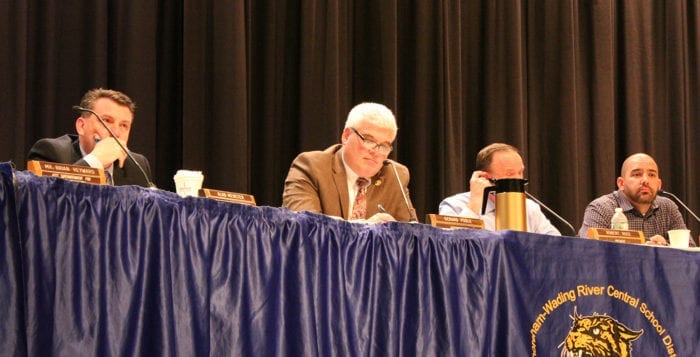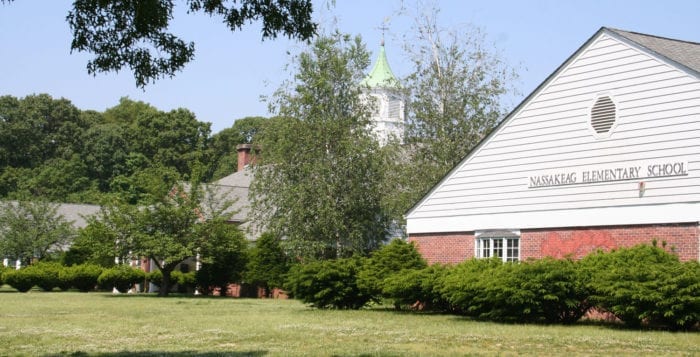The board of education was met with loud cheers and a round of applause for its decision March 27.
Shoreham-Wading River school district added pre-kindergarten classes in its initial 2018-19 budget, but after receiving backlash from parents, the board unanimously voted to remove it from the plans.
“I’m a firm believer in early childhood education,” said Shoreham resident Megan Rowick, who said she attended the March 20 meeting in favor of the idea, but that her feelings quickly changed. “There are great benefits for social, emotional and cognitive development, and while not mandated by New York State I feel that pre-K is a gift.”
She explained what changed her mind.
“I absolutely support public education and I am a big proponent of a pre-K program in Shoreham-Wading River. But it’s our job not to push our own agenda, and I hear what the community is saying and want to make a decision based on that.”
— Erin Hunt
“When I saw the plans I immediately had concerns, and I know I’m not alone,” said the pre-K, kindergarten and first-grade teacher, whose son and 3-year-old daughter will have gone through pre-K programs. “Why wasn’t the community surveyed to see who has children that will be 4 years old before Dec. 1 and who would be interested in this pre-K program? It would have been helpful to gather information prior to this, then you would know how many sections you really need, or who would choose our program.”
The board of education announced at its March 20 meeting the plan was to include the addition of part-time pre-K classes into the district’s $74,776,072 budget draft. To fund the proposed program and avoid piercing the tax levy increase cap while keeping at the current 0.9 percent increase budget-to-budget, $270,000 in contingent funds was worked into the draft. Kindergarten class sizes would have increased at Miller Avenue School to clear classrooms for the program.
Residents questioned if the district had done sufficient research.
Wading River resident Robin Heavey said she was concerned, since the program was set to begin with an expectation of declining district enrollment, that if the trend were to reverse, the larger class sizes would place a burden on the teachers and their students.
“I do not think it is fair to those children, especially at such a tender age when they are learning reading and mathematics and things that require such attention from teachers, to put them in a situation where they are increasing their numbers for a non-essential and a non-required program,” she said.
Colette Grosso agreed that there’s no crystal ball for what enrollment would look like, and added she would prefer to see the money spent elsewhere.
“When you say the money could be used for this [pre-K] program or things that come up as needed, I’m just wondering why some of our needs over the past couple of years have not been addressed,” the Shoreham mother said. “We’ve had two suicides, I can’t even quantify how many suicide attempts we’ve had, several of which have been this year. You’ve got kids in the hospital for anxiety, eating disorders, all kinds of things — with the current climate, don’t we think security and mental health staff would be the best use of this money?”
Wading River resident Nick Gallucci pointed out the elected representatives on the board campaigned on a message of financial responsibility last year. He asked the board if pre-K would not just be economically feasible now, but five years from now.
“I think pre-K is an essential element to a child’s education,” he said, adding his two children have gone to pre-K through a private organization in Wading River. “My belief right now is that this is getting rushed to get passed when there is a general distrust in the district’s spending habits. Tying pre-K into a budget in a rushed manner regardless of the negative tax cap only fosters that district and strays far for the 2017 hashtag #RestoreTheFaith.”
The 17-year public education high school teacher pointed out how last year’s budget just passed with a close 1,112-992 vote and said while he originally indented to stand up in front of the board and ask that pre-K be a separate proposition in the budget vote, he understood it is no longer an option after the district decided it would be packaged within the budget. He said, looking at the issue like a patchwork quilt — trying to do a lot with a little — he now sides with those who wanted pre-K removed from the budget.
“My belief right now is that this is getting rushed to get passed when there is a general distrust in the district’s spending habits.”
— Nick Gallucci
“My fear is heading into this budget that they are going to vote on one issue, and I don’t want my child’s education within this district being jeopardized by a program that is already existing within this community,” he said. “Perhaps our focus should be on things that cannot be replicated.”
Board of education president Robert Rose agreed that while no one could argue with the merits of a pre-K program, the process left much to be desired.
“Why the rush?” he asked before then asking the board if it was unanimous in removing the item from the budget. “The board should give the same about of time to pre-K like we are the future of the Briarcliff building. Are we really prepared? We’re putting the horse before the cart.”
Rose said Superintendent Gerard Poole recommended to the board on three separate occasions to hold off including pre-K in the budget — that it wasn’t the best fit this year. Rose said Poole also made the recommendation the board take the next six months to work with the community on the idea.
“We want to make sure it’s the most transparent process possible,” he said.
Trustee Erin Hunt, who proposed the idea after hearing the desire for a program from other residents, personally agreeing, said she appreciated the feedback and is thankful that the past two meetings people had shown up.
“I wish the conversation went differently — I absolutely support public education and I am a big proponent of a pre-K program in Shoreham-Wading River,” she said. “But it’s our job not to push our own agenda, and I hear what the community is saying and want to make a decision based on that. To potentially sacrifice the negative levy for a program I personally believe in I think is a mistake. I would never want a budget, especially this one, which is an outstanding budget, to fail.”








